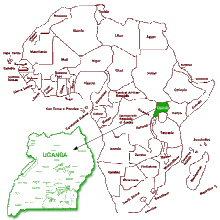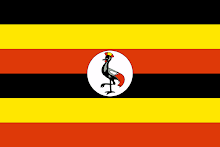
I spent my last few weeks teaching family planning classes at the Hospital with nurse Harriet as my trusty translator. I had another male nurse translate for one of my classes and after I completed the class the women asked to get a woman translator because they didn't believe a man would translate what I was saying correctly. I had fifty cycle beads a week before I left and within two days of classes we taught and sold all fifty beads! So within a few short weeks we totaled 138 cycle beads sold. It was a great way to end my family planning project!

I also decided to finish up the hand washing project at Kawolo hospital with some health promotion. After stepping in human poo, we managed to paint, "Thank you for washing your hands" in Lugandan on the inside of three sets of latrines located on the borders of the hospital.

While wrapping up my public health projects I also had the opportunity to assist another volunteer with her project dealing with persons with disabilities. We got a group together to meet weekly where the parents would meet for a support group and then the children would meet for play, musical, and physical therapy. In Uganda, there's a terrible stigma that disability stems from someone sinning or their parents sinning, so many of them believe that their child's disability is their fault. The parents also believe that their child's physical or mental condition cannot be changed and will never be improved. The support group was directed towards fighting these stigmas. Lugazi actually has an existing group of adults with disabilities who meet regularly and another part of this project was teaching them how to make soap which we then made a deal with the hospital to purchase their soap from them for the hand washing stations as well as other uses. I really loved working with this project because I can't even describe how incredibly happy these children are. They are truly some of the happiest children in all of Uganda and maybe even the world. :) Below are Sam, Joel, and Bulukan from the group.



On my last friday in Uganda we attended one of the street childrens' soccer practices and then taught them the importance of dental hygiene and how to brush and floss their teeth. We then gave all of the boys two toothbrushes, a tube of toothpaste, and floss.

I thought I'd add some pictures of some of my favorite Ugandan friends. One is of Fiona and I in the very spot where I would buy pineapples. I calculated that I ate approximately 48 pineapples over the summer and now the pineapples here at home don't really taste good. Another is a picture of Sandra and Sarah (Youth Outreach Mission members) as they joined Sami and I for our home visits for children with disabilities. The other picture is of Betty and I at her little home in the hospital workers quarters. Two days before I left she had Josephine (public health nurse), Sami, and I over for omelets and homemade passion fruit juice before I went on an outreach with Josephine. It was such a fun day. Betty cranked her favorite Ugandan songs as the four of us cooked in her little cement countered, no running water, kitchen. I then got to spend the rest of the day free of mzungus and just with Josephine and other hospital workers as we traveled to a rural village. The hospital workers set up a temporary hospital in a church where they screened for HIV, gave immunizations, diagnosed people and offered them the little prescriptions we brought with us, and of course we did some family planning courses. We also went around and gave children deworming pills.



I am now at home sitting on a bed about a billion times more comfortable than any other piece of furniture even available in Uganda missing it like a fat kid on a diet misses cake. It's kind of funny how I ended up loving every minute of living in Uganda despite it's flaws; the bathrooms with only a hole in the ground and remnants of people with bad aim around the hole, cold showers outside with dirty water, repetitive food options, being dirty always, one pair of trusty chacos I wore daily, doing laundry in a basin with dirty water, doing dishes outside with dirty water, mosquito bites, other mysterious bites, massive bugs hiding amongst your bananas, gekos on the walls, a house made of cement with no furniture besides the beds, running water and electicity only some of the time, long taxi drives that feel like the indiana jones ride while being accompanied by 33 live chickens, wearing a head wrap to hide dirty hair, constant dirty fingernails, falling into holes, eating pork that still has hair on it, fish for dinner that still has eyes to stare at you, knowing that dinner was alive only a few hours before eating it, Ugandans being forever late and unreliable, stopping an entire days work because that's what the Ugandans do when it rains, and yet I miss it so much I'd fly back in a heart beat. Their flaws aren't really flaws at all just differences, and after about a month and a half those differences just become a way a life, one that you love more than your original. Ugandans are truly the kindest most loving people I've ever met. Unlike us, they base their entire lives on relationships and not schedules or to do lists. Which makes public health projects move slowly by slowly (A Ugandan phrase), but in the end I've not only taught Ugandans, but they've taught me. They've taught me to slow down, don't stress the small stuff, and really get to know each and every person in your life and base your day not only on completing tasks but nurturing relationships. One example of this is when Josephine told me, "First, we will eat lunch with Betty, then we will go to the outreach" (when we were already an hour or so behind schedule). This way of life was frustrating at first, but when I got the hang of it, it was so much more fulfilling than any other way to live. I'm so grateful for the patience I learned and how it's okay to put aside the to do list and have lunch with Betty. I also learned that "things" or the material possessions in our lives do not bring us happiness. I lived for three months lacking the basics that even most of the poorest of Americans have and I have never been happier. Most Ugandans will never see the day where they will own an ipod, computer, car, or even a humble home and yet they are such a happy people. After my experience I feel that I no longer will ever have any reason to complain. Over the past few weeks I've taken a mental note on what others around me, or even myself, complain about and how really everyone of those complaints isn't even half of what the Ugandans could complain about. But don't Ugandans complain, they smile and laugh all day long. :)
I'm so grateful for my experience and I sincerely hope that I'll have the opportunity to one day return to Uganda and further the public health work that I started. For now, I hope to keep every lesson that I learned as I continue on. I'm currently looking for a job, studying for the GRE, and looking into potential grad schools as I am forever missing life in Uganda.



